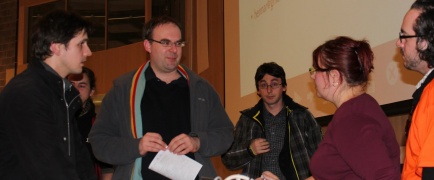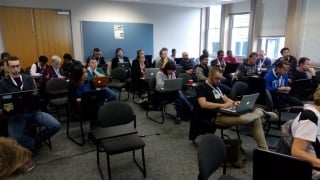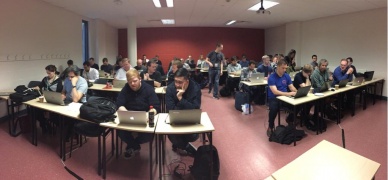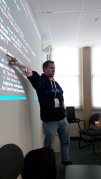DevJam: Difference between revisions
David Mudrak (talk | contribs) mNo edit summary |
David Mudrak (talk | contribs) mNo edit summary |
||
| Line 7: | Line 7: | ||
hackfestau15damyon.jpg|DevJam | hackfestau15damyon.jpg|DevJam | ||
</gallery> | </gallery> | ||
Moodle DevJam is a kind of [[Developer meetings|developer meeting]], typically organised as a part of MoodleMoots. | |||
The tradition of Moodle DevJams - formerly known as HackFests - started in 2006 as a part of the MoodleMoot at the Open University in Milton Keynes, UK. Since then, Moodle developers from various institutions, schools and companies, gather regularly to discuss wide range of topics related to the Moodle development roadmap, implementation of features and organising the way how to collaborate effectively. | The tradition of Moodle DevJams - formerly known as HackFests - started in 2006 as a part of the MoodleMoot at the Open University in Milton Keynes, UK. Since then, Moodle developers from various institutions, schools and companies, gather regularly to discuss wide range of topics related to the Moodle development roadmap, implementation of features and organising the way how to collaborate effectively. | ||
Revision as of 12:00, 13 June 2017
Moodle DevJam is a kind of developer meeting, typically organised as a part of MoodleMoots.
The tradition of Moodle DevJams - formerly known as HackFests - started in 2006 as a part of the MoodleMoot at the Open University in Milton Keynes, UK. Since then, Moodle developers from various institutions, schools and companies, gather regularly to discuss wide range of topics related to the Moodle development roadmap, implementation of features and organising the way how to collaborate effectively.
Very often, these developer meetings have a pretty form. Moodle community developers involved with moodle core and plugins development, gather in a very unconference style. The event is not really a training, no slides are needed - but they are welcome, and usually not much actual code is produced. Typical activities include short show & tell presentations, discussions in working groups etc.
The event relies strongly on active participation of attendees and folks are warmly encouraged to participate actively.





